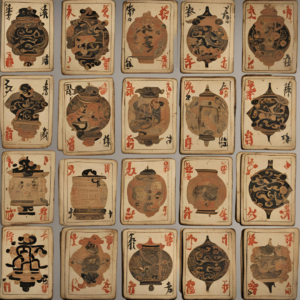
For centuries, card games have been more than just a time cruncher—they’ve been a window into different cultures, a form of social connection, and even a way to sharpen mental skills. From the smoky parlors of 18th-century Europe to the bustling streets of ancient China, card games have woven their way into human history, offering insight into societal values, economic exchanges, and strategic thinking. Let’s journey through the fascinating evolution of card games, explore their diverse types, and uncover the benefits they bring.
The Origins of Playing Cards: A Journey from East to West

Ancient Chinese “money-suited” playing cards, early Ming dynasty.
Playing cards are believed to have originated in China during the Tang Dynasty (618-907 AD), with some of the earliest references to a game known as the “leaf game.” These cards were linked to paper currency, reflecting economic activity and serving as a means of entertainment among nobility. The concept spread along trade routes to India, Persia, and eventually reached Europe in the 14th century. The arrival of playing cards in Europe marked a new era in the game’s evolution, where decks began to take on regional styles and suit symbols, from Spain’s coins and cups to France’s hearts and spades.
2. Card Games Across Cultures: A Snapshot of Diversity
Europe: The Birth of Trick-Taking Games
As cards spread across Europe, they adapted to local tastes, and by the 15th century, the French had introduced their now-standard suits: hearts, diamonds, clubs, and spades. Europe became the birthplace of trick-taking games like Whist, which eventually evolved into Bridge, and Piquet, which became popular in France. Trick-taking games involve players taking turns to play cards, aiming to win specific cards or “tricks” based on predetermined rules. Such games required not only luck but a solid grasp of strategy and anticipation of opponents’ moves, making them ideal for social gatherings.
Asia: Card Games of Luck and Strategy
In Japan, the traditional game of Hanafuda emerged, using brightly colored cards adorned with flowers and animals. Originating in the 18th century, Hanafuda offers players the challenge of matching and scoring cards based on seasonal images. The game remains popular in Japan and has even influenced video game culture, with Nintendo originally starting as a Hanafuda card company. Meanwhile, in India, games like Teen Patti and Rummy are popular, blending skill and chance in card matching and ranking.
The Americas: Poker and the Influence of the Wild West

In the Americas, card games became synonymous with the Wild West. Poker, originally derived from the French game Poque, became an iconic part of 19th-century American culture. Poker’s mix of luck, skill, and bluffing mirrored the rugged individualism of frontier life. By the early 20th century, Poker tournaments had spread internationally, giving rise to televised poker matches that popularized games like Texas Hold’em.
3. Types of Card Games: From Luck to Logic
1. Trick-Taking Games
Trick-taking games, such as Spades, Hearts, and Bridge, involve players trying to “take” specific cards played in rounds. These games encourage social interaction and involve strategic planning, as players must predict the moves of others.
2. Matching Games
Matching games, like Rummy and Mahjong, require players to create sets or pairs. These games demand pattern recognition and strategic decision-making, helping players hone cognitive skills in a social setting.
3. Shedding Games
In shedding games, players aim to discard all their cards before opponents do. Uno is a famous example, often played at family gatherings. Shedding games are straightforward, accessible, and encourage light-hearted competition, making them popular across all ages.
4. Collectible Card Games (CCGs)
In the 1990s, games like Magic: The Gathering brought collectible card games into the mainstream. These games involve creating a personalized deck of cards that can then be used to challenge opponents, combining both strategy and a level of personal expression.
4. The Benefits of Playing Card Games
Social Connection and Communication
Playing cards is inherently social, requiring interaction with others that often fosters camaraderie and communication skills. Multiplayer card games can bridge generational gaps, bringing families together during gatherings and creating lasting bonds.
Cognitive and Strategic Skills
Card games often involve memory, pattern recognition, and strategic planning. Games like Bridge and Poker require players to keep track of cards and calculate probabilities, while games like Rummy demand the strategic forming of sets. This can sharpen mental agility, particularly in older adults, who may benefit from card games to help reduce cognitive decline.
Emotional and Stress Relief
Playing cards can serve as a healthy escape from daily stress. Whether it’s the joy of winning a hand, the thrill of bluffing an opponent, or the satisfaction of a well-played game, card games provide a form of relaxation and joy. Studies have shown that playing games can boost endorphin levels, helping people unwind and enjoy social relaxation.
Enhancement of Patience and Concentration
Patience is key in many card games, as players need to wait for the right moment to act. Games like Solitaire, for example, help players develop focus and patience, ideal qualities that can also benefit people in real-world tasks. The act of patiently calculating moves helps foster a sense of discipline and resilience.
Mathematical and Logical Skills
Many card games, especially those involving probabilities or odds, engage mathematical skills. Poker and Bridge, for example, require players to understand odds and manage risks, helping players develop a better understanding of probability and decision-making.
5. Card Games in the Digital Age: A New Chapter
With the rise of digital technology, card games have taken on a new life online. Online platforms allow players to connect with others worldwide, giving them access to endless variations and global tournaments. Games like Hearthstone and online Poker have created a new generation of digital card players, making it easier for people to experience the joy of card games from the comfort of home.
In a rapidly evolving world, digital platforms have also made card games more accessible, allowing individuals with physical limitations to participate virtually. Moreover, the digital format has introduced new themes and narratives into card games, from fantasy battles to historical re-enactments, blending traditional card play with modern storytelling.
Card games have come a long way from their origins in ancient China, adapting to cultures, technology, and societal trends along the way. They’ve been a universal thread across generations and cultures, teaching us about strategy, patience, and connection. Whether in a cozy living room with family, a bustling casino, or a digital screen, card games remain timeless, uniting people worldwide in the universal language of play.
